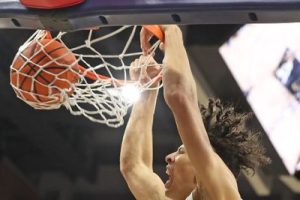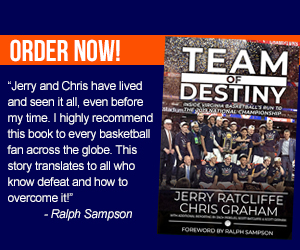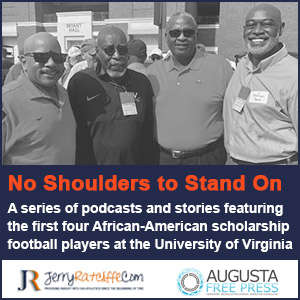What Virginia basketball really needs right now is a win over Miami
By Jerry Ratcliffe
Miami coach Jim Larrañaga knows exactly what the key to Saturday’s game at Virginia will be: preventing the Cavaliers from scoring.
Actually, UVA has done a pretty good job of that themselves — somewhat by design by pace of play — but some of it simply from inconsistency offensively from Tony Bennett’s starters.
UVA ranks No. 329 out of 350 Division I schools in terms of scoring, with an average of 62.9 points per game, somewhat similar to Bennett’s early years in Charlottesville without an abundance of shooters, and second-lowest average of the Bennett era.
The Cavaliers averaged but 57 points per game in 2019-20, the year after the natty, the postseason canceled by the pandemic. Despite a 23-7 record that season, it was the lowest average by a Virginia team since the school joined the ACC in the early 1950s.
Bennett is accustomed to low-scoring games as long as his defense shuts down opponents, which hasn’t happened as often as he would have liked this season either. It’s not a vintage UVA defense.
Between 2014 and 2020, the Cavaliers finished among the nation’s top five all but once in defensive efficiency, according to basketball analyst Ken Pomroy’s rankings. In 2016, UVA merely finished in the top 10 of those rankings.
Something happened in 2021 and hasn’t changed. In 2021, Virginia managed to only finish in the top 40 defensively, which left its fan base aghast.
Little did they expect this season to be worse, much worse. The Cavaliers enter the Miami game ranked 90th by kenpom.com in defense (although they’re No. 10 nationally in the NCAA’s scoring defense category, 59.6 ppg).
Larrañaga certainly knows the tempo Bennett prefers, but he has more worries than pace.
“The first thing is, defensively, you’ve got to keep [Virginia] from scoring because if they score, they’re going to be able to set their defense every time,” Larrañaga said recently. “Even when you force them to miss, they’re very good at getting back in conversion and preventing fast breaks.”
Miami depends heavily on forcing turnovers (the Hurricanes lead the ACC with 300 of ‘em) and getting into the open court.
“When you attack the Pack-Line defense, often times you can get a 3-point shot, but they’re very good at defending the three, so a lot of the game is going to depend on whether or not we make threes,” said Larrañaga, who spent years on Terry Holland’s staff during one of the greatest stretches in Virginia basketball history.
The Pack-Line has been somewhat better in defending the triples of late, although some opponents just seem to find the hot hand from long distance against UVA. In the Cavaliers’ win over Boston College a few days ago, the Eagles made only 5 of 21 from Bonusphere.
Still, Virginia ranks an abysmal No. 270 in 3-point field goal defense, with opponents having made 162 of 461 (35.1). Miami has several shooters, capable of taking over a game.
With a smaller lineup, featuring four — count ‘em, four — sixth-year seniors, the Hurricanes like to spread the floor, which has been effective against Virginia this season.
Miami is led by 5-foot-11 point guard Charlie Moore, and surrounded by 6-3 guard Isaiah Wong, who averages 16 points per game, 6-5 Kameron McGusty (17.5 ppg) and Sam Waardenburg, a 6-10 center who can also spread the defense as a stretch-five shooting threat (46 percent from behind the arc).
Larrañga pointed out that while UVA may have started the season with new pieces, the Cavaliers have settled in and are playing well. He noticed the uptick in physical play by Virginia, which has helped produce wins over the past few weeks.
“Their frontcourt guys at the four and five are much bigger, thicker and bulkier than our frontcourt, so we’ve got to really pull together to be sure that we can execute our game plan against them,” the Miami coach said.
Bennett realizes that may be to his advantage, and could plan to attack the ‘Canes in the paint, a place Miami has been vulnerable. Still, Virginia knows its own weakness, which appears to be a Hurricane strength.
“Teams that have shot the 3-ball and spread us and used ball-screens, that’s been hard for us, especially with [Miami’s] four sixth-year players, their experience, their talent,” Bennett said. “That’s why they’re at the top of our league. That puts great pressure on your defense.”
Miami sits tied in second place in the ACC, a half-game behind Duke, heading into the weekend. The ‘Canes are 8-3 in the league and 16-6 overall, having dropped a game at home this week to Notre Dame. Larrañaga’s squad is also 5-1 in true road games, best in the conference.
Virginia (13-9, 7-5) needs quality wins down the home stretch in order to qualify for the NCAA Tournament. Five of the next seven games are against ACC teams that have winning records in the league, so there is ample opportunity to make some noise.
While the Cavaliers aren’t exactly an offensive juggernaut, they have gotten more production from a couple of their players in recent games.
Jayden Gardner has averaged 16 points a game over the last five outings and has made 48.4 percent of his shots (31 for 64) during that stretch. Meanwhile, point guard Kihei Clark has averaged 15.3 ppg over his last three games, while shooting 51.8 percent from the floor and 41 percent from the arc (7 for 17).
While Reece Beekman hasn’t scored a lot of points as of late, he’s been effective in other areas, satisfied with allowing his teammates to produce. Beekman, who is No. 2 in the nation in assist-to-turnover ratio, is one weapon against turning the ball over to the aggressive Hurricanes.
While UVA may not be scoring at a high clip, particularly from the 3-point line, Bennett made an interesting comment after the BC win this week when he said the Cavaliers are making up for that inefficiency by getting to the free-throw line more (Virginia was 26 of 29 from the stripe against the Eagles), by getting second-chance points with offensive boards, and by scoring off opponents’ turnovers.









